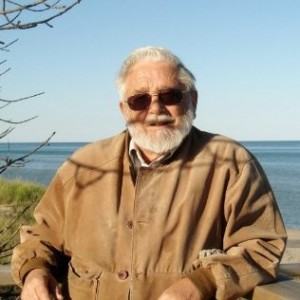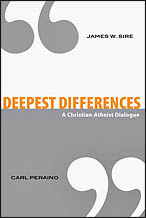
The Worldview Question-and-Answer series with Jim Sire continues with the question:
How can we find common ground when someone has a radically different world view from our own? — Micheal Hickerson, ESN Blog Contributor
James W. Sire’s response:
As a Christian we start with a distinct advantage. We know that all human beings are made in the image of God and that we all live in God’s orderly and meaningful creation. In other words, there is a truth to know, and we were designed to know the truth. The fall has separated all of us from our creator and our ability to know has been adversely affected. But in Christ, we can know the truth and the truth will set us free, first of all from the consequences of sin and then from much of the blindness induced by our fallen nature. This we know. It is a part of our common faith as Christians. In this sense, the content of our Christian faith is a fact of reality. It is who / what we and our world really are. It is not only our ontological reality but the reality of all human beings.
Of course, this fundamental ontological ground is not “known” by those who are not believers. In fact, it is not even “known about” by many of our unbelieving friends. While most of us use the necessary “laws of logic” to think (they are indeed part of who / what we are), we do not share a fully common intellectual (epistemological) ground. That is, we neither assume nor argue from the same fundamental notions about ourselves in the world. So how do we communicate with our non-believing friends?
First, we place our confidence in our own Christian foundations as outlined above. Let’s say we are conversing with Mary, a casual friend and unbeliever. We know that despite our many, many differences, she is created exactly like us. We know she bears the broken image of God as we do. We know that when she thinks, she obeys the same “laws of logic” as we do. We also know that even if she is a naturalist (i.e., atheist) and thinks she lives in totally material reality, she actually lives in the same real God-created world as we do. In fact we have a common ontological ground. Reality is one thing. There really is a God or there is not.
Second, because we are made by God to know him and his world, we know that Mary as an atheist has an understanding of that reality that is different from ours. If she reveals it in some way, we can know what Mary’s intellectual world actually is. So we watch and we listen; we pay attention to what she says, what she reveals about her values, her loves and hates, her hopes and dreams, her religious inclinations and commitments —in short, who she thinks she and the world really are.
And at the same time, when there is comfortable occasion to do so, we share our values, loves, hates, hopes, dreams, religious commitments, life experiences. That is, we become more than casual friends. We come to “know” her and see just what both separates and unites us (for there will be both). The difference between our “intellectual” grounds will gradually be understood by both of us. We will both learn that there are some basic things we hold in common.
If we listen, we will be heard. If we are being honest with our own lives, we also become trustworthy, worthy of being heard. As she observes our lives, she will learn relevant truths of the Christian faith and some of them will begin to become plausible (likely to be recognized as true).
Now I’m going to say something absolute I cannot prove: There will be something in the testimony of your life and by your words that you give of your faith in Christ that will challenge Mary. She will see that God in Christ is both an answer to many of her longings and a Person whose call she must answer. She will realize that to become a disciple of Christ, she will have to change not just a few ideas but to repent, to radically reorient her worldview. She will be challenged at the roots of her life and lifestyle.
Will she finally be drawn to Christ? That’s between her and our gracious and loving God. We as Christians do not change any other person’s “ground.” That role belongs to the Holy Spirit. Thanks be to God.

by James W. Sire and Carl Peraino. InterVarsity Press, 2009.
Note this confession from a failed apologist: If you want to see my own attempt to lay before my friend Carl, an atheist scientist, such an apologetic, see Deepest Differences (James W. Sire and Carl Peraino. InterVarsity Press, 2009). So far —both before and after publication —my attempt has been unsuccessful. At the end of the book, we both explain why we have not yet found or come to common ground in much of anything.
———————————————————————–
Thank-you! to Mike for posing the question. Thank-you! to Jim for addressing the question. If you’re a reader and desire to dig into the question further or ask another question, please reply to the blog post or email Tom. If you desire, we are more than willing to attribute the question to “Anonymous.”
A few follow-up questions for your consideration:
* Have you had similar conversations?
* If so, how have you responded?
* How do you enter such dialogue in on-line interactions?
Note: Click here for earlier ESN blog posts by Jim Sire, including excerpts from his autobiography Rim of the Sandhills.
Updated profile picture/caption. 11/12/2012. 11:21PM CST.
Tom enjoys daily conversations regarding living out the Biblical Story with his wife Theresa and their four girls, around the block, at Elizabethtown Brethren in Christ Church (where he teaches adult electives and co-leads a small group), among healthcare professionals as the Northeast Regional Director for the Christian Medical & Dental Associations (CMDA), and in higher ed as a volunteer with the Emerging Scholars Network (ESN). For a number of years, the Christian Medical Society / CMDA at Penn State College of Medicine was the hub of his ministry with CMDA. Note: Tom served with InterVarsity Christian Fellowship / USA for 20+ years, including 6+ years as the Associate Director of ESN. He has written for the ESN blog from its launch in August 2008. He has studied Biology (B.S.), Higher Education (M.A.), Spiritual Direction (Certificate), Spiritual Formation (M.A.R.), Ministry to Emerging Generations (D.Min.). To God be the glory!

Leave a Reply